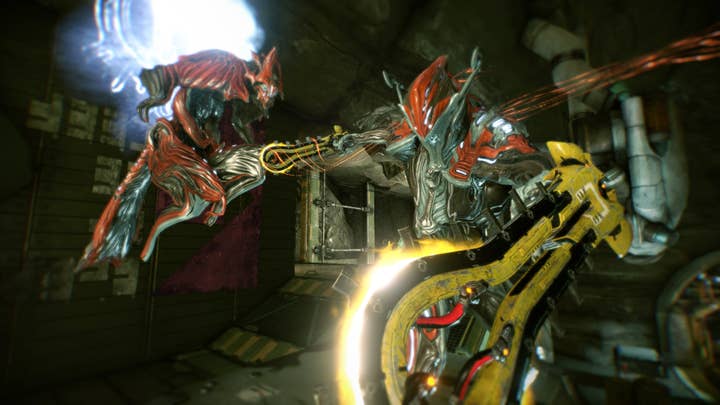Changing industry economics let Bungie forge a new destiny | Opinion
The idea of a developer operating an expensive online game would once have seemed ludicrous -- Bungie's new independence shows how much has changed
It seems fairly safe to say that only a few years ago, the Destiny franchise would have been dead in the water. The game, originally announced with grand fanfare and pitched as a new pillar of the business by Activision Blizzard, hasn't met with whatever lofty internal goals the publisher had set -- and the firm's expression of disappointment in financial calls suggested that the much-vaunted relationship with Halo creators Bungie which spawned Destiny had cooled off as a result.
Perhaps as little as half a decade ago, that would have been the end of the story. There would have been pushing and pulling over extrication from contracts, but ultimately a publisher losing confidence in a big, expensive online game with significant ongoing upkeep costs would have been the end of the line (or at least a precursor to an unloved and poorly implemented transition to free-to-play, and then the end of the line).
Bungie is an extraordinarily successful and no doubt financially secure developer. But the notion of even a developer of that scale taking on the ongoing operation of a project that a major publisher had given up on would have been unthinkable in the past. Of course, that's a counterfactual -- we don't know for certain that, in a world where Bungie wasn't able to take on the Destiny franchise by itself, Activision would definitely have shut it down -- but the fact of Activision's willingness to countenance handing it back to the developer is a pretty compelling argument in favour of that view.
"This is a logical next step to a decade of change that has seen self-publishing becoming a valid strategy for an increasingly wide range of games"
We also, of course, don't know the precise financial details of Destiny 2's performance, or how the various iterations of its content and business models have worked out. The exact details of what Bungie is committing itself to remain hidden. Nonetheless, this is a milestone that clearly indicates a major shift in some of the industry's underlying economics.
To be clear, it's the online nature of Destiny 2 that makes this into such a dramatic move. Publishers have in the past handed control of franchises and IP back to developers; it's not a common thing, but certainly not unheard of in cases where a developer has further ambitions for an IP that the publisher has written off. An online game, however, comes with an enormous commitment in terms of ongoing upkeep, infrastructure and so on. Moreover, Destiny 2 has just started rolling out a year's worth of relatively major content updates, which players have prepaid for through an annual pass system -- a new business model whose success has yet to be proven, but which certainly commits the developer to a pretty aggressive content release schedule.
What has changed in the economy of the industry to make it possible for Bungie to say "okay, we got this" in response to a publisher's cooling ardour for their gigantic collaborative project? Part of it is certainly to do with Bungie itself, a developer whose work on Halo and (perhaps to a lesser extent) Destiny has made it into an industry icon comparable with the likes of Activision's conjoined firm, Blizzard. It has the reputation and the financial muscle to make this work -- but that in itself is predicated largely on other changes in the industry landscape.
Infrastructure cost is one of those changes. I wouldn't hazard a guess at how much Destiny's online infrastructure costs to run, but I'd certainly wager that the rapid progress and competition in the cloud infrastructure space has (or at least could have) shaved that cost down to a fraction of what it was when Destiny first appeared. Physical game distribution and sales has also become vastly less important for a title like Destiny, while marketing for this kind of game has also been turned on its head by the newly outsized influence of streamers and other such channels.
"Activision's failure to turn Destiny into a major pillar of its business despite the calibre of its developer is a poor showing"
Many of the things that a decent sized developer still couldn't take on without publisher support, in other words, are now within reach -- especially for a developer that has the clout to get a direct line to supportive platform holders for its self-publishing experiment.
Just because Bungie can do it doesn't mean that any developer can go out and self-publish the industry's next World of Warcraft, but it's a pretty major difference nonetheless. It's a logical next step to a decade of change that has seen self-publishing becoming a valid strategy for an increasingly wide range of games, starting from small indie titles and working up to the point where games largely indistinguishable in quality from publisher-backed AAA blockbusters (in fact, in some cases even better quality than those games) are being pushed to market directly by their creators. Big online games have in some ways been the last bastion of publisher dominance -- although there have been notable exceptions like Digital Extremes' Warframe, a self-published free-to-play title that arguably serves as a trailblazing proof of concept for what Bungie can now do with Destiny.

From Activision's side of things, the decision to part ways with Bungie and its franchise is understandable. Publishers have very different financial requirements to developers, and a game that's profitable enough for a developer to continue to work on isn't necessarily a good use of capital for a company like Activision.
Overall, though, the whole episode doesn't look great -- Activision's failure to turn Destiny into a major pillar of its business despite the calibre of its developer is a poor showing, especially given that many of the problems that hampered Destiny 2's early success (stripping the game back to ostensibly casual-player friendly systems that actually just made it rather boring, plus building in an obtrusive microtransaction system) had a strong whiff of publisher interference around them. Destiny may not have been performing to expectations, but dumping it just before EA's rival title Anthem launches looks like a publisher running a little scared. It refocuses attention on an Activision Blizzard slate that increasingly looks almost as dependent on Call of Duty as Take-Two used to be on Grand Theft Auto.
For developers both large and small, though, Bungie's regaining of its franchise, its game and its independence should serve as an interesting reminder of how much the industry's economic basis has changed. Publishers still serve a vital role for many games, but their exclusive realm has now shrunk back to the point where working with expensive licensed IP is pretty much the only thing that you really, absolutely need to work with a publisher for.
Nothing else in the past decade has been a death-knell for publishing, and nor is this latest step. But it's a further sign that the playing field is levelling out, and publishers increasingly need to show developers exactly what value they add to a partnership, rather than simply taking game creators' subservience as their natural due.









